Category: Team
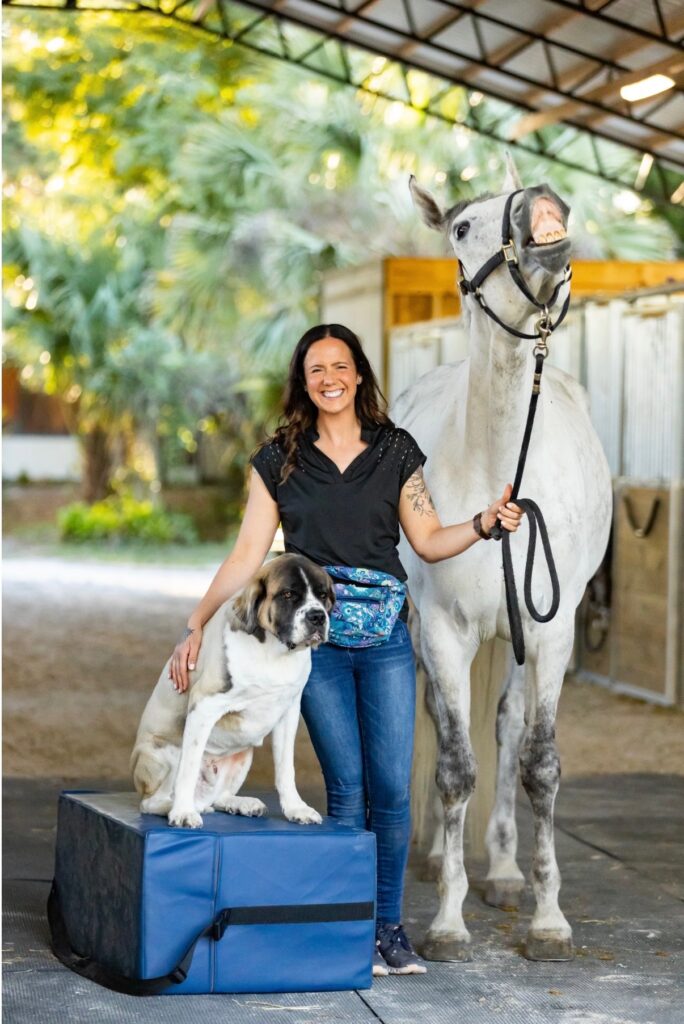
Dr. Jamie Klements joins the Palm Beach Equine Clinic in Wellington, FL, from the Midwest, where she operated her own practice as an equine chiropractor and acupuncturist. With a passion for learning, Dr. Klements has a wealth of knowledge on equine wellness and comes to the clinic to apply her skills to sports medicine alongside PBEC’s Dr. Bill Patterson.
Q: What made you want to become an equine veterinarian?
A: I was one of those kids who was born loving horses. My family didn’t own horses, but I took riding lessons and worked in barns as much as I could. I rode in the hunters as a hobby, but never as a professional. I was pre-med for most of my undergrad schooling. I started spending time with my horse’s veterinarian during my junior year of college after a summer job at the Cleveland Clinic determined human medicine wasn’t for me. I love horses and medicine, and the switch made sense. Today I am still grateful I get to work with horses for my job.
Q: What’s your background in veterinary medicine?
A: I’m grew up in Ohio and attended Miami University in Ohio for my undergraduate degree. I went to vet school at Iowa State University. After graduating from vet school, I worked at Lebanon Equine Clinic in Ohio for two years. In 2017, I started my practice called Midwest Veterinary Chiropractic and Wellness that focuses on chiropractic care and acupuncture treatment for horses. I am located near the World Equestrian Center in Wilmington, OH. I have worked as a show veterinarian and see my clients at their home farms or at the horse show for acupuncture and chiropractic care.
Q: What drew you to equine chiropractic and acupuncture, and what was the training process like for these specialties?
A: I’ve always had dachshunds, and while I was in vet school, I had one that needed back surgery. There was a vet at the practice who did acupuncture on him, and it helped him so much with his rehabilitation. Seeing how positively the treatment affected him made me interested in learning how to do it for my own patients.
Currently, neither acupuncture nor chiropractic is a boarded specialty but a certification training program that is available after you are a veterinarian. I completed my acupuncture training immediately out of vet school. I attended the Chi University that is outside of Ocala, FL. I started my chiropractic training at Parker University in Dallas, TX, which is a human chiropractic school that also offers an animal certification. I have studied with a professor at the Health Pioneer Institute near Chicago, IL, who focuses on the neurology related to chiropractic. Finally, I just completed a master’s degree in Equine Integrated Veterinary Medicine from the Chi University, which covered spinal manipulation (chiropractic), rehabilitation, pain management, and acupuncture for horses.
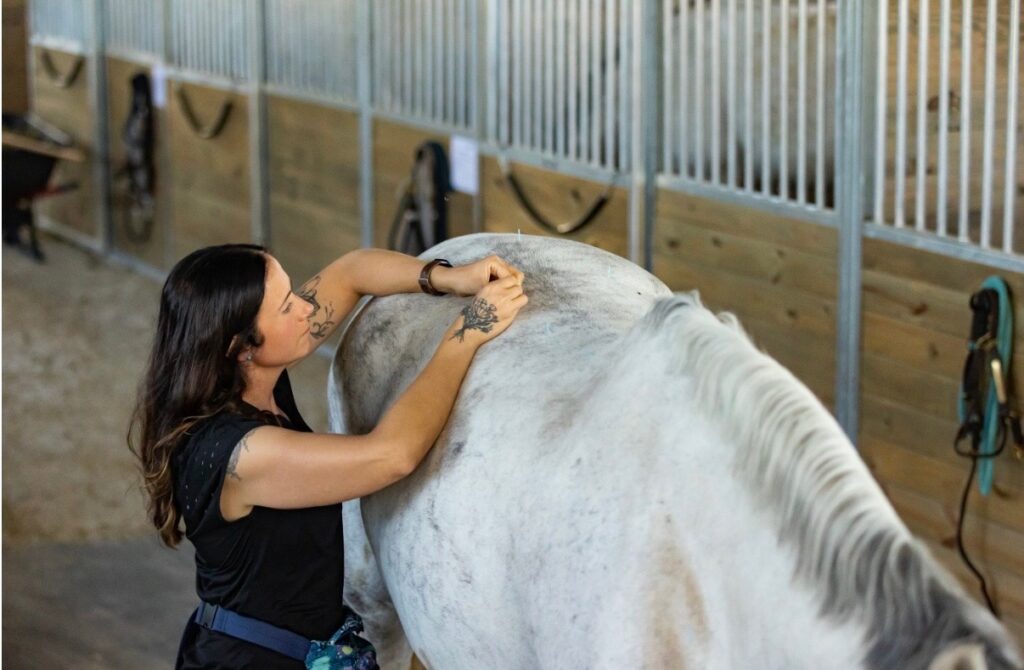
Q: Why is continuing your education as a veterinarian important to you?
A: I’m an education junkie. I want to help my patients as much as I can, so I enjoy always learning something new. I decided to come down to Palm Beach Equine Clinic to learn more about sports medicine. I have known Dr. Bill Patterson for a while, and he practices sports medicine related to how the whole horse moves and specifically the back and neck. I am here to work with him to learn how to combine sports medicine with the Traditional Chinese Medicine that I’ve been focused on.
Q: What benefits do you think Traditional Chinese Medicine provides for equine athletes?
A: Learning Eastern or Chinese medicine helps with paying attention to the horse as a whole being and how their environment, job, and personality can affect their health. It has taught me additional signs to watch for when examining a horse and deciding on a diagnosis. Show horses are limited in the medication they can receive for pain and discomfort, but we can offer acupuncture or massage if a horse needs some care before the competition. I have been a part of helping horses with a lameness or health care issue using Chinese medicine when Western medicine hasn’t been successful or had a good answer.
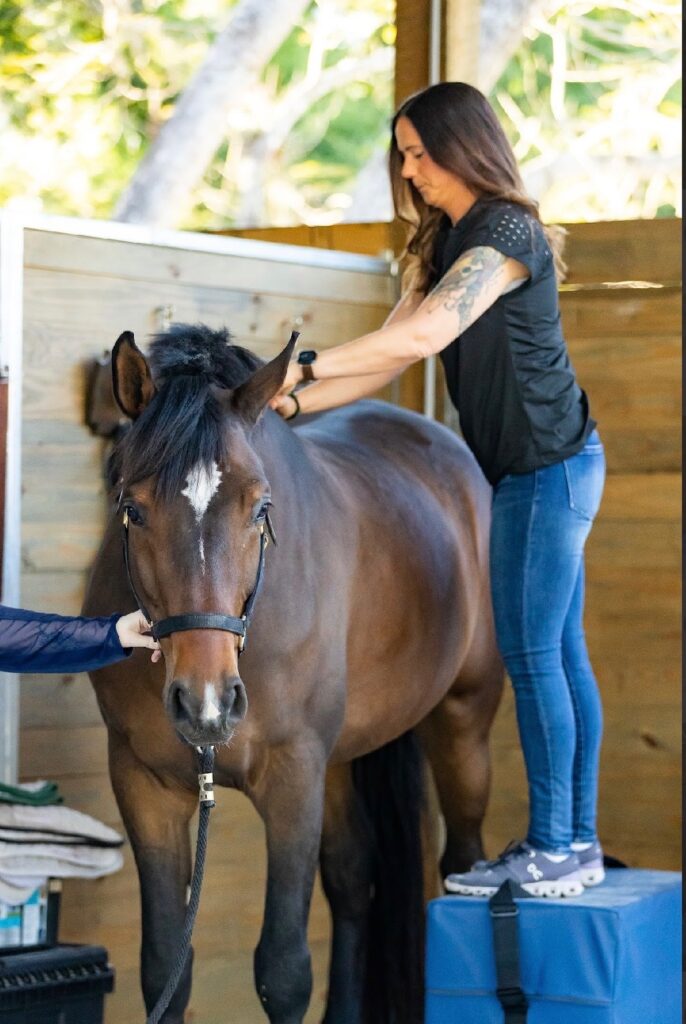
Q: How has it been living and working in Wellington so far?
A: I’m still settling into my role at PBEC, but I’m excited to be here. If someone is interested in sports medicine, working here is the dream because you get to learn about every specialty all in one place. Everyone comes to Wellington to work and learn from the best in the sport horse industry. I think this is the equestrian equivalent of moving to Los Angeles to be in the movies. I love Florida. There is so much wildlife, it’s beautiful, and I can garden in the winter!
I’ll be working seasonally at PBEC. My partner and I bought a farm in Loxahatchee, near Wellington, a year and a half ago. I still see clients in Ohio and Kentucky, so I currently go back and forth. I plan to spend most of the winter in Wellington and travel to Ohio and Kentucky in the summer to see clients.
Q: How has it been working with Dr. Patterson and the team at PBEC?
A: It’s a dream come true. I’ve learned so much from Dr. Patterson and seeing more complex cases has been really interesting. Everyone at the clinic has been helpful and friendly. I am excited to get to work with and learn from the best in the industry.
Q: What does a typical week look like for you right now?
A: I often see patients for acupuncture or chiropractic treatment at the start of the week when the horses have some downtime away from the horse show. Monday is usually my busiest day and favorite day to work. A lot of barns are closed, and the horses enjoy how quiet it is while I’m working on them.
For the rest of the week, I usually ride around with Dr. Patterson and help with lameness cases as they pop up. I am also going to cover some shifts at the horse show on weekends, which I like because I get to see my clients succeeding in the ring after I’ve helped them.
Q: What do you enjoy doing in Wellington when you’re not working?
A: I ride when I can. I also love the ocean. My partner, Steve, and I like to go offshore fishing. I also enjoy spending time with my dogs. We have a dachshund named Phoebe and a St. Bernard named Bruno, which covers both ends of the size spectrum!
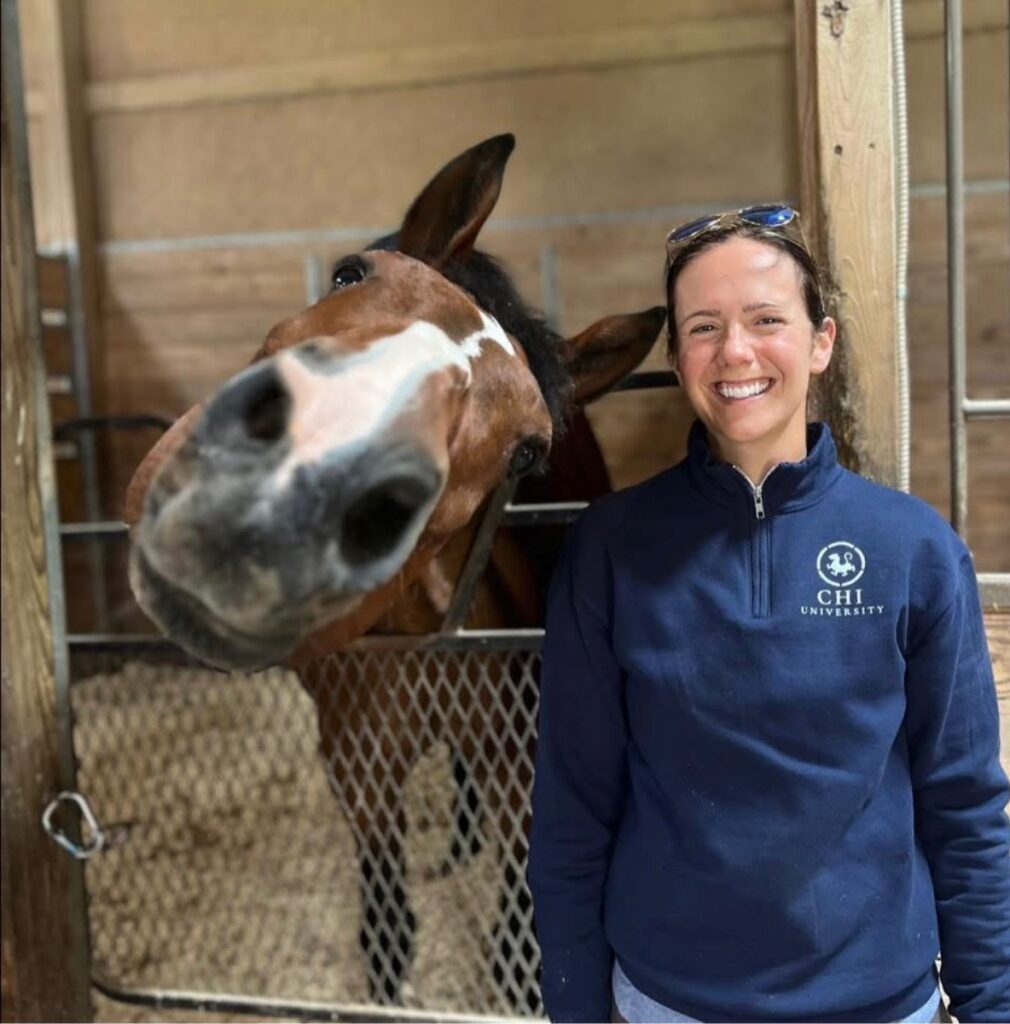
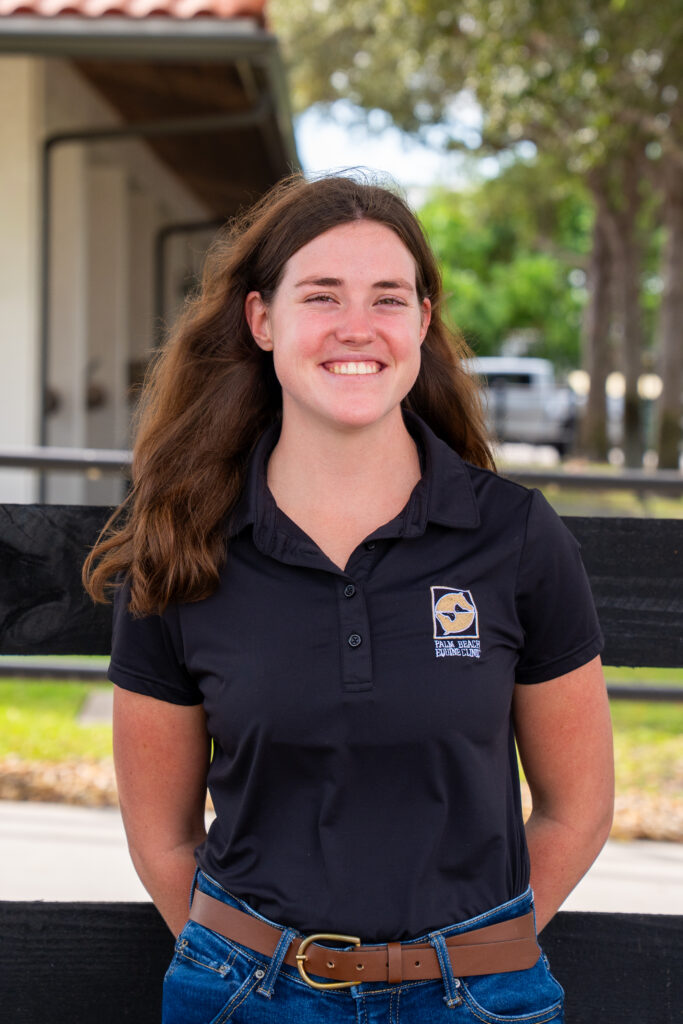
Photo courtesy of NewStyle Digital.
Meet PBEC Veterinary Intern Dr. Claire McDonald
Dr. Claire McDonald grew up in the town of Jefferson City, Missouri. She knew from a young age that she wanted to be a veterinarian. Dr. McDonald completed her undergraduate degree in Biology at William Woods University in Fulton, Missouri where she had excellent mentorship from the university equine veterinarian, sparking her interest in equine practice. Dr. McDonald went on to complete her Doctor of Veterinary Medicine degree at the University of Missouri with Magna Cum Laude honors. Dr. McDonald began her internship at Palm Beach Equine Clinic shortly after graduation. Dr. McDonald loves the variety of caseload here at PBEC and learning about all aspects of equine practice.
Where are you from?
I am from Jefferson City, MO, which is located between St. Louis and Kansas City. You get the best sunsets here, plus all four seasons in their truest form.
Where did you go to school?
I completed my undergraduate degree in biology with a pre-veterinary focus in 2021 at William Woods University in Fulton, MO. The school was unique because it had an equestrian program with western, dressage, hunter/jumper, and saddle seat disciplines. There was no shortage of opportunities to work with and be around a wide range of horses. As part of our pre-vet curriculum, we learned equine anatomy and physiology, as well as the basics of lameness exams, dentistry, and more. It definitely sparked my initial interest in equine veterinary medicine.
From there, I attended the University of Missouri College of Veterinary Medicine, where I was fortunate to have two full years of clinical rotations rather than the standard one year at most schools. This allowed me to rotate through the small animal, farm animal, and equine areas of the hospital and broaden my knowledge.
Have you always known you wanted to be an equine veterinarian? What has your journey been like getting to this point?
From my undergraduate days to my time in veterinary school, I knew equine medicine was something I had to include in my veterinary career. I absolutely love working with these amazing creatures, spending most of the day working outside, and developing lifelong friendships with my clients. Also, there is a severe shortage of equine veterinarians in this country, and I want to help fill that need! As a horse owner, I know how incredibly valuable it is to have access to an equine veterinarian.
What does a typical day as an intern look like?
It depends on the rotation! We all rotate through medicine, surgery, ambulatory, anesthesia, and overnight. My current rotation is medicine, so my typical day starts by getting up a few hours early (sometimes as early as 5 a.m.) and checking on my patient notes from the overnight shift. From there, I go to the clinic between 6 a.m. and 7 a.m. to begin physical examinations and report my findings to the head clinician on the case.
During 8:30 a.m. rounds, we all update each other on our cases and treatment plans for the day. I then perform any necessary treatments throughout the day and update the medical record. At 5 p.m., we all round again to review the day’s activities on our cases, and we round with the overnight intern on what each patient needs overnight.
What’s your favorite part of working at PBEC?
My favorite part of working at PBEC is being able to work alongside so many other veterinarians and specialists. It allows you to get an opinion on any case you have from somebody right down the hall. Although this job can be tough at times, I definitely feel myself growing in my knowledge and confidence every day!
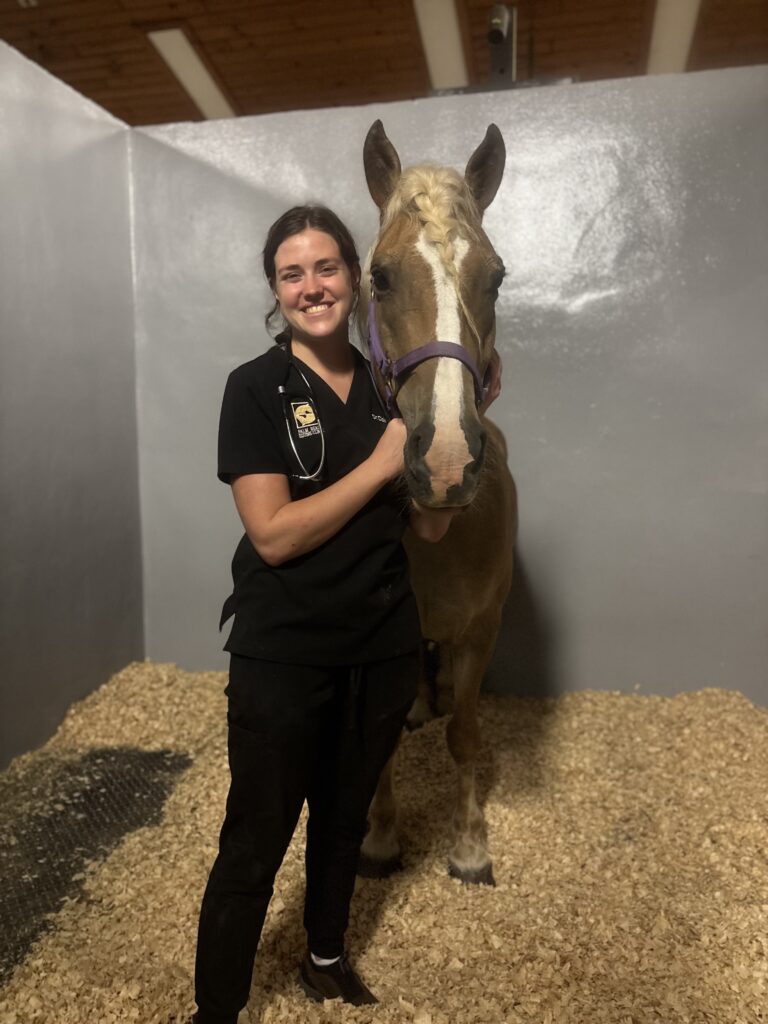
What’s something you hope to learn or accomplish by the end of your internship?
By the end of my internship, I hope to be equipped with the skills and knowledge needed to be a strong general equine practitioner, wherever I end up. I want to be a helpful resource in more rural areas where veterinary care is difficult to find. I also plan to stay in touch with the team at Palm Beach Equine Clinic, and I can reach out anytime I have a question.
What do you find most rewarding about working as an equine vet?
What I find most rewarding is the gratitude from clients when you show up to help their horse. There is also nothing more gratifying than seeing a horse go from being sick and in pain to happily eating and walking out of the hospital healthy. Even though this area of veterinary medicine can be physically demanding and require long hours, it is definitely worth it to me, knowing that I’m making a difference for both the horse and the owner.
What do you do in your free time?
In my free time, I love to explore, whether that involves going to the beach, visiting Disney World or the Keys, or trying out new restaurants with my intern-mates. I also enjoy running and listening to music to clear my mind.
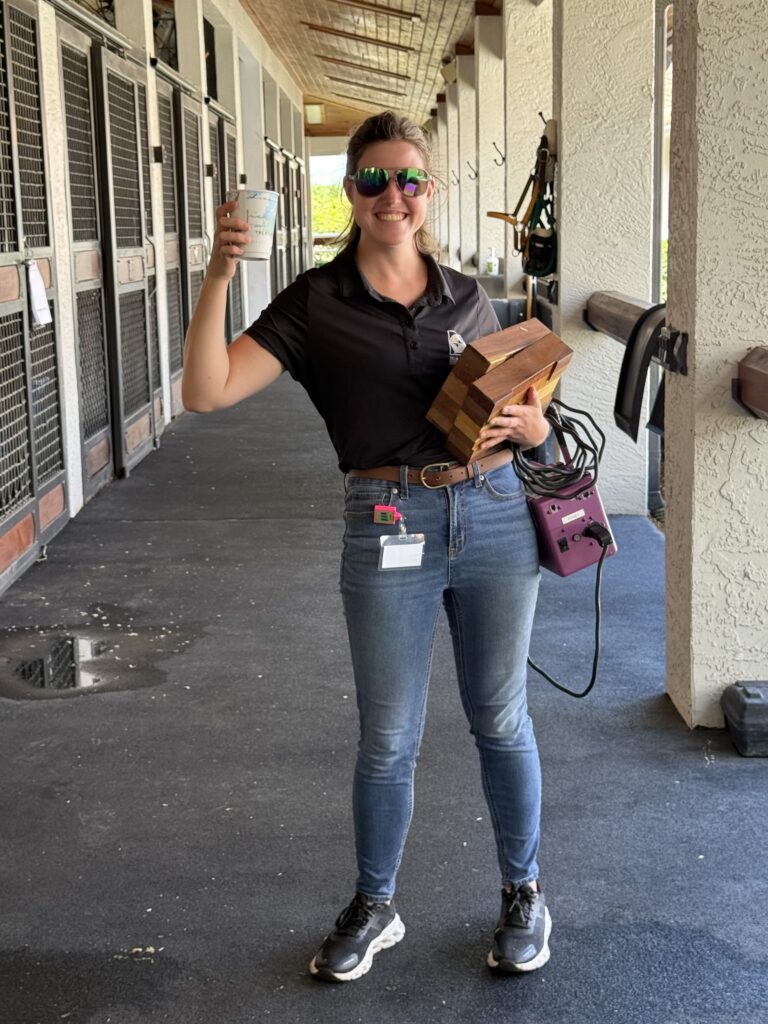
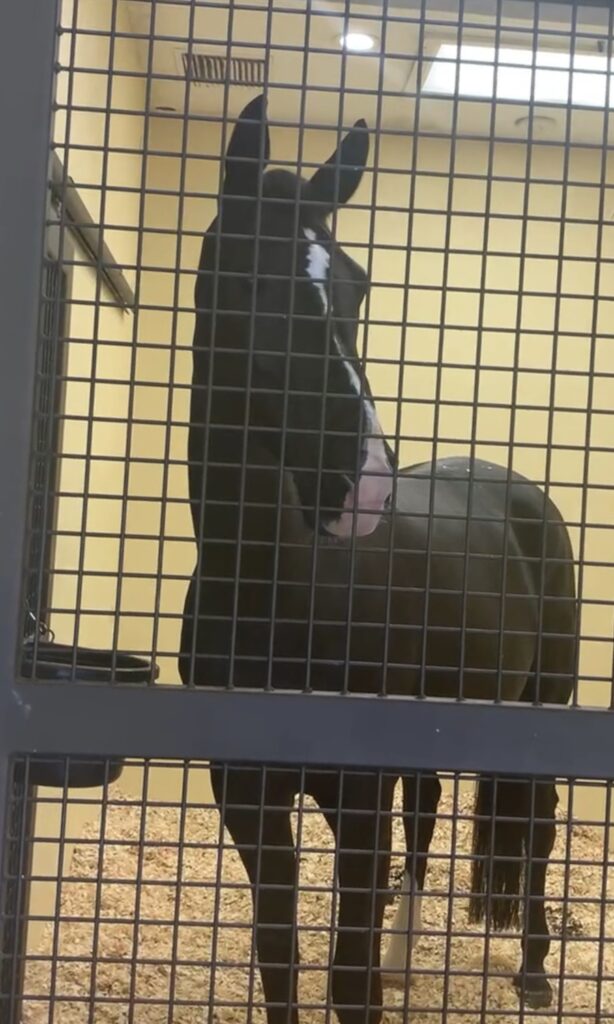
Photo courtesy of Jennifer Chaszar
When 17-year-old Oldenburg gelding Madison Avenue (by Madison x Olympic Ferro), known as “G6” in the barn, developed recurring fevers and concerning bloodwork in September 2025, his owner, Jennifer Chaszar, knew something wasn’t right. His primary veterinarian, Dr. John Lockamy, had been monitoring him closely at home at Lady Jean Ranch in Jupiter, FL, but as his inflammation markers climbed and his fever returned, Dr. Lockamy recommended a deeper look.
“G6 had developed a fever that returned after initial treatment, he had a low white blood cell count, and his serum amyloid A (SAA) level was elevated at 3,000 in his bloodwork,” Chaszar recalled. “Dr. Lockamy referred us to Palm Beach Equine Clinic (PBEC) because we didn’t want to overlook a more serious underlying issue.”
SAA is the major acute phase protein in horses and is produced during the acute phase response, which is a nonspecific systemic reaction to any type of tissue injury. While usually very low or close to zero, that number will rapidly and dramatically increase with a systemic infection.
A Critical Revisit
G6 was initially treated at PBEC in Wellington, FL, in 2023 when he had recurring colic symptoms. What was initially thought to be ulcers was diagnosed through gastroscopy as delayed gastric emptying by Dr. Jordan Lewis. A change in diet, with an emphasis on the portion size at each feeding, helped increase motility in his digestive tract and eliminate symptoms for a time, but those returned two years later.
G6 arrived at PBEC on September 21, 2025, where he was evaluated by internal medicine specialist Dr. Emilee Lacey and intern veterinarian Dr. Rachael Davis. G6 had been experiencing intermittent fevers, lethargy, and colic signs. An abdominal ultrasound soon revealed a left dorsal displacement of his large colon, which thankfully resolved with supportive care.
However, his bloodwork told a more complicated story. With inflammation still present, the PBEC team performed a gastroscopy to visualize the stomach lining. “The gastroscopy showed a few ulcerations of the squamous mucosa of the stomach and a nodular mass in the pyloric region,” said Dr. Davis. “The duodenum (first part of the small intestine) was mottled in appearance. Biopsy samples from both the pyloric mass and the duodenum were collected and submitted for histopathological analysis, which revealed evidence of inflammatory bowel disease.”
Chaszar remembered the relief she felt when the biopsy results returned. “The biopsies came back negative for malignancy,” she reported. “There was no evidence of cancer — just inflammatory changes. That provided tremendous relief and allowed us to focus on healing and recovery.”
G6 remained bright, cooperative, and comfortable during his stay, a testament to the attentive nursing and veterinary care he received.
Healing at Home
Dr. Lacey prescribed a thoughtful treatment plan that included gastroprotectants, dietary changes, and careful monitoring at home.
“Due to his known diagnosis of delayed gastric emptying and the suspicion of inflammatory bowel disease (IBD), we recommended trialing a diet that excluded wheat and his known allergies of corn, oats, rice bran, and carrots,” explained Dr. Lacey. “IBD has been loosely associated with gluten intolerance (wheat) in horses.”
Back home, Chaszar followed PBEC’s instructions closely to help support G6’s recovery. “His diet was modified to include softer, easily digestible forage and smaller, more frequent meals,” she noted. “I monitored his temperature, appetite, and demeanor every day to be sure he was progressing.”
Dr. Lacey and Dr. Davis also stressed the importance of daily exercise to promote normal gastrointestinal motility, hydration, and close communication with the veterinary team. They also wanted to see G6 back in 30 days for an examination.
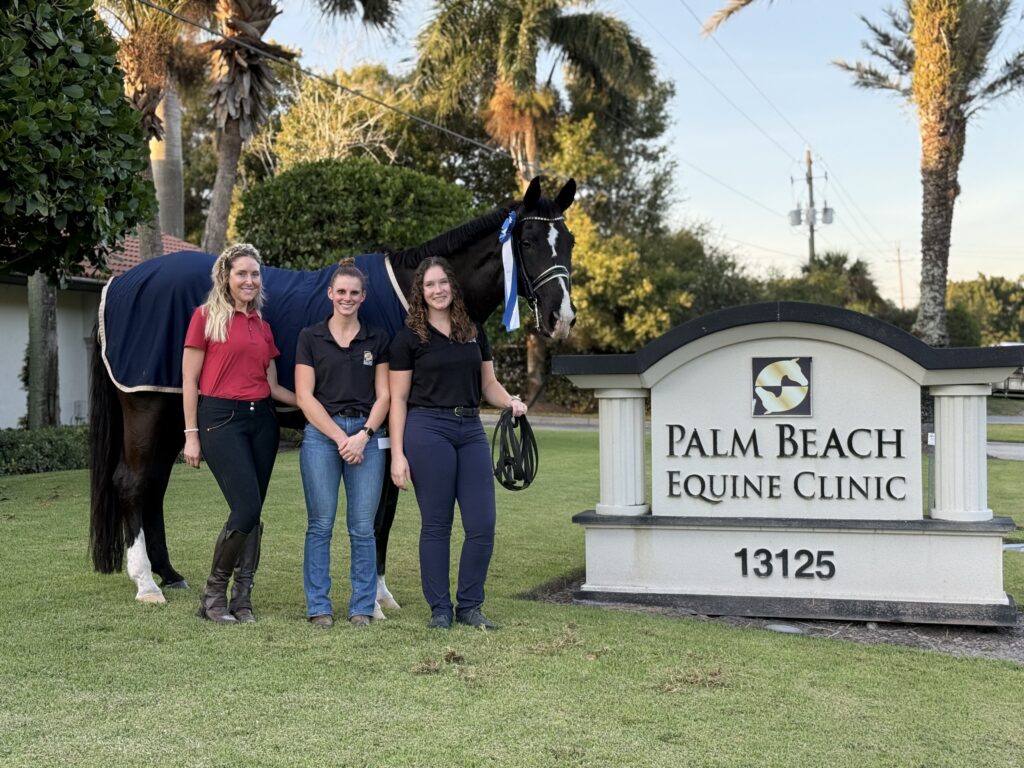
Photo courtesy of Jennifer Chaszar
A Promising Recheck
Exactly one month later, G6 returned to PBEC for a scheduled recheck gastroscopy. Chaszar described this visit as a hopeful milestone. “His second visit was a one-day appointment designed to see how the pyloric nodule and inflammation had responded to treatment,” she said.
The news could not have been better. Dr. Lacey reported that the previously seen ulceration had completely resolved, and the pyloric nodule had reduced by about 75%, indicating that the treatment plan was working.
With that progress confirmed, G6 discontinued the gastroprotectants and continued with supportive nutrition and management. “It was wonderful to see that improvement,” said Chaszar. “His appetite has returned to normal, and his energy is strong. G6 is back to acting like a four-year-old! When I lead him to the arena, he nickers under his breath and then shows me the Spanish walk and downward dog tricks that he does before we move on to the serious part of work.”
A Testament to Exceptional Care
Chaszar credits PBEC’s team not only for their medical expertise but also for the warmth and professionalism that defined every interaction. “The entire PBEC team, from the front desk to the technicians, nurses, interns, and veterinarians, has been exceptional,” she shared. “They are proactive and collaborative in their approach, and their compassion, communication, and attention to detail are truly remarkable.”
She added that PBEC’s dedication sets the standard for equine veterinary medicine in South Florida. “Seeing G6 healthy, thriving, and back to himself reminds me of the incredible work PBEC does every day. I am especially grateful to Dr. Lacey and Dr. Davis for their thoroughness and dedication throughout his journey.”
Why Owners Trust Palm Beach Equine Clinic
For Chaszar, the most valuable part of the experience was PBEC’s collaborative, transparent approach. “Every veterinarian and staff member took the time to explain each step,” she said. “They even shared images from his scopes so I could fully understand his care. Their organization, genuine care, and follow-up are second to none. I am deeply thankful for their continued support.”
G6 is back to his regular routine, and his recovery journey highlights not only his resilience but also the power of skilled veterinary care and commitment to excellence.
Horse owners seeking a clinic that blends top-tier medicine with genuine empathy will find exactly that at Palm Beach Equine Clinic. G6’s story stands as one more shining example of the exceptional work they do every day. If you need first-class care for your horse or have questions, contact Palm Beach Equine Clinic at 561-793-1599. Visit www.EquineClinic.com for more information.
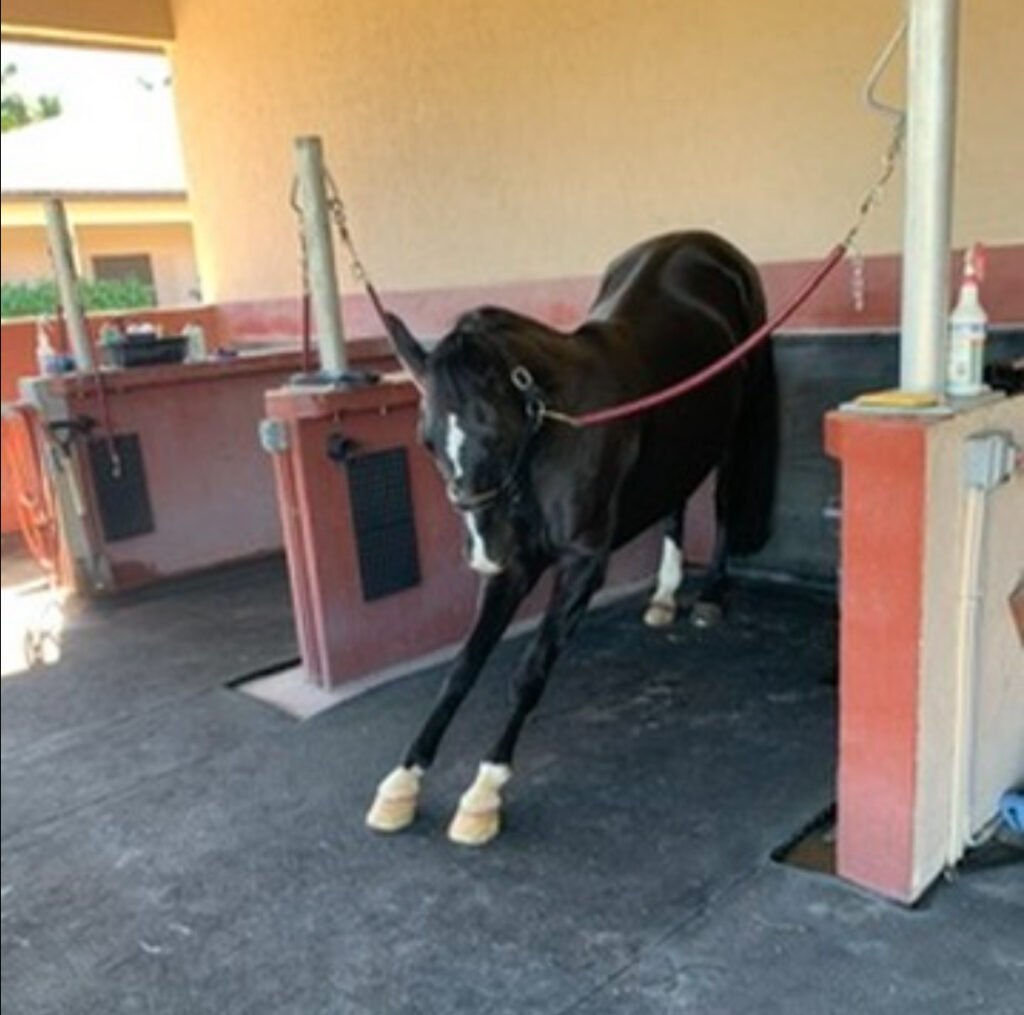
Photo courtesy of Jennifer Chaszar
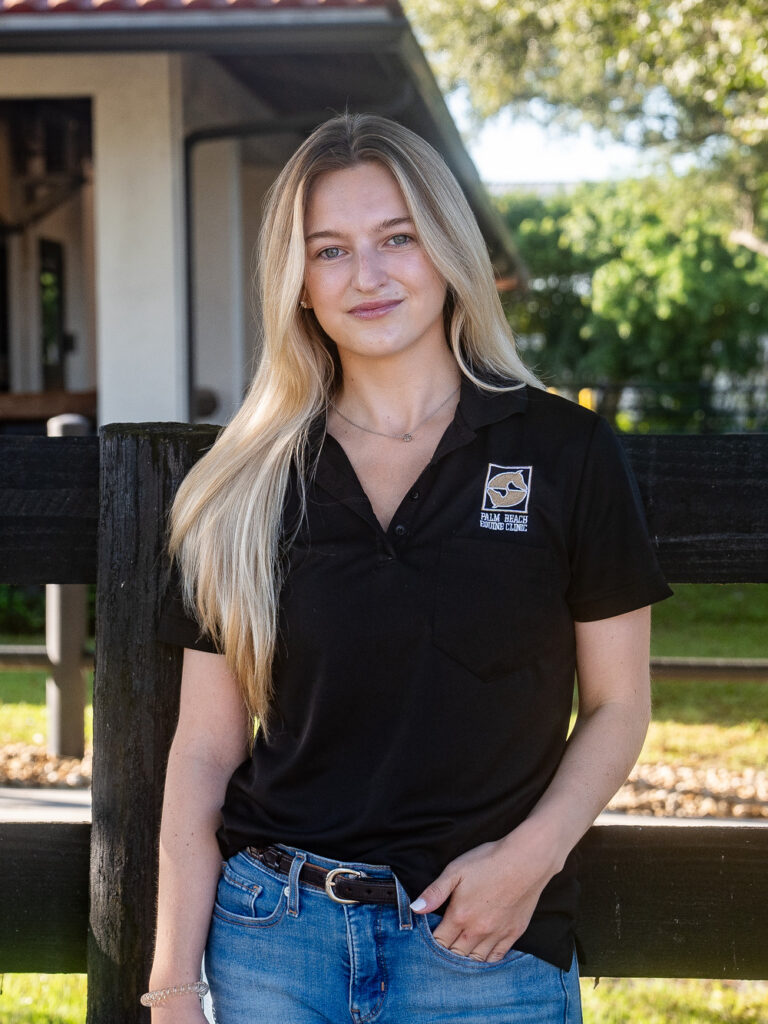
Photo courtesy of NewStyle Digital.
Meet PBEC Veterinary Intern, Dr. Emma Newell, Palm Beach Equine Clinic’s New Internal Medicine Specialist
Dr. Newell earned her veterinary degree from the Royal Veterinary College in 2025 after completing her Animal Science (Pre-Vet) studies at Auburn University, where she graduated Summa Cum Laude in 2021. Growing up in the hunter/jumper community in Connecticut inspired her lifelong passion for equine health and her interest in sports medicine. She is dedicated to advancing her clinical skills and providing high-quality care to equine patients.
Outside of work, Dr. Newell enjoys staying active and returning to Connecticut whenever possible to spend time with her horse.
What has been your journey to becoming an equine veterinarian?
I grew up in the hunter/jumper industry, primarily showing ponies, and that’s where I discovered my passion for sports medicine. I attended an agricultural high school in Connecticut, where I was able to major in equine sciences. That experience drove me to study at Auburn University for my undergrad, majoring in animal science on the pre-veterinary track. I graduated Summa Cum Laude in 2021, and, from there, moved to London for school at the Royal Veterinary College. Being from Connecticut, and then moving down to Alabama, I got to see the differences in the horse industry throughout the country, and I wanted to take it to an international level.
What was it like adjusting to life in the United Kingdom, and what differences did you notice in veterinary medicine there versus the United States?
I had experienced London in earlier stages of my life, so the transition wasn’t hard for me. I loved the lifestyle and living over there. The horse care and equestrian community in the U.K. are both so strong that attending that school was a great decision for me.
I think some of our methods of treating sport horses are very different, like how we view the use of antimicrobials and medications. Having that perspective when treating sport horses here in the U.S. is important because it provides insight into the veterinary care they received overseas before being imported.
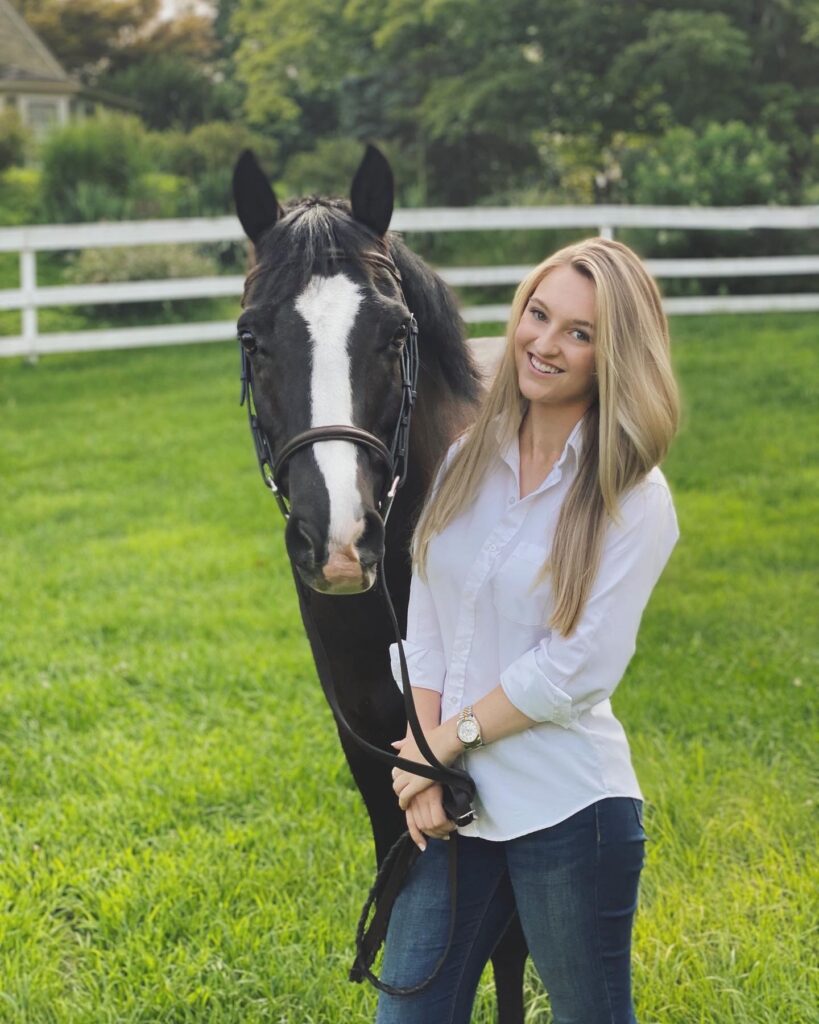
Photo courtesy of Emma Newell.
What interests you most about sports medicine?
I love performing lameness exams, and I love providing care to equine athletes. When I was showing, I was very driven, so bringing that mindset to veterinary medicine and seeing patients able to perform at the top level really motivates me.
What was the process for applying to become a PBEC intern?
The process includes completing an externship at PBEC, submitting your paperwork — which consists of your CV and letters of reference — and then participating in the interview phase.
What responsibilities does an intern have at PBEC?
As an intern, you do two-week rotations throughout the hospital. Rotations include anesthesia, surgery, ambulatory, and overnights, giving you experience working in all different environments, from surgical cases to in-depth internal medicine cases. During the anesthesia rotation, you are solely in charge of providing anesthesia to patients, whether that’s standing or general anesthesia for surgical patients – that’s quite interesting. For the surgery rotation, you are responsible for patient care in the hospital prior to and post-op, and you get subbed to scrub into surgeries. Ambulatory is my favorite rotation, and you’re on the road with vets who primarily provide ambulatory care, which is a great experience.
What’s it been like working with the team and the other interns at PBEC?
The team at Palm Beach Equine Clinic was something I was really excited about coming into this internship. We have a great, well-rounded group of veterinarians with diverse experiences and passions, which allows us to learn different things from each person. It’s the same with our intern team; we’re all well-rounded and have different strengths, and I think that that really pushes me as an individual to grow.
What advice would you give to students interested in equine veterinary medicine?
Take every chance to get hands-on experience. Put yourself out there and look for opportunities to learn under different equine veterinarians. Everyone has different life experiences and points of view, which is essential to making you into a well-rounded vet. As we all know, the horse world is quite small, so building connections throughout the community is definitely something that will help you.
The Last Leg of International Travel: CEM Quarantine
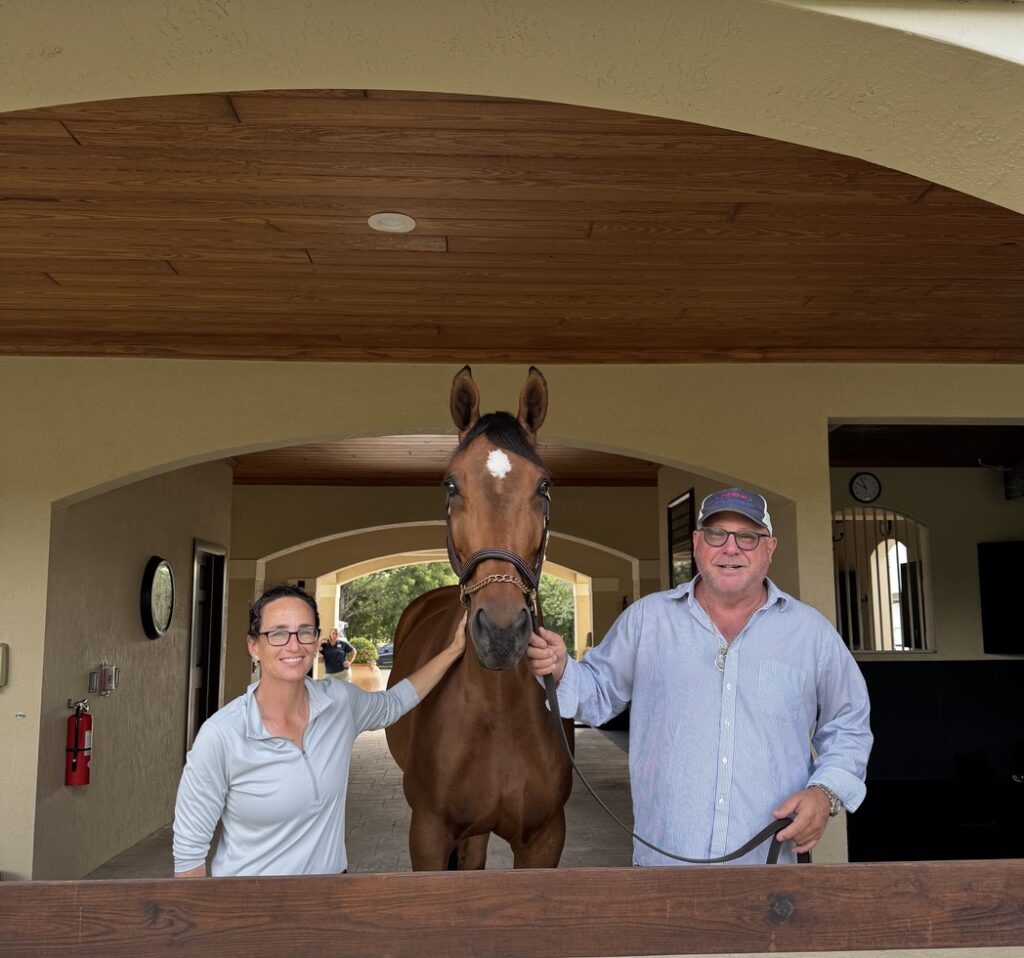
Whether returning home after a thrilling summer competing on the European circuits, traveling from a home base abroad, or importing a newly purchased equine, every horse entering the United States must follow specific guidelines based on the country of origin. Once the horse “clears customs” at the airport, satisfying United States Department of Agriculture (USDA) import requirements, there’s one more thing owners must consider before their horse reaches its final destination.
Mares and stallions remaining in the United States beyond the temporary stay period must undergo additional quarantine for Contagious Equine Metritis (CEM). This sexually transmitted bacterial infection can cause infertility in mares and is carried by stallions. While endemic in Europe, the disease is not currently in the U.S., so testing and quarantine for horses entering the country from areas with confirmed cases are essential to maintain that disease-free status.
Fortunately for horses traveling to Florida, Palm Beach Equine Clinic’s Dr. Jordan Lewis works closely with Richard Faver at Ossian Ventures, one of the largest commercial CEM quarantine facilities in Florida, to oversee and conduct the rigorous testing process, which differs based on whether the animal is a mare or stallion.
“Mares are usually with us for about 15 days. They need three sets of negative cultures, 72 hours apart, and then five days of washing with chlorhexidine and applying silver sulfadiazine as a topical treatment, which we call ‘clean and pack,’” explained Dr. Lewis, adding that they take samples from three areas of the mare and also pull a blood test, called a complement fixation (CF). The CF results and each set of cultures must be sent by mail to a lab for testing, and turnaround times are about a week for the cultures and a few days for the blood.
“Stallions are a little different,” continued Dr. Lewis, noting that their process takes about 35 days. Within the first few days, a culture is taken from the stallion and sent for testing.
“When the culture comes back negative, we have a set of mares called test mares that are cycled and ready to breed,” she said. “Those stallions live cover two test mares, which then start getting cultured on day three post-breeding. They go through the same process as the other mares: three sets of cultures, 72 hours apart. Twenty-one days after breeding, they do the CF test on those mares.”
Dr. Lewis noted that the test mares undergo a process called “short cycling” to ensure they will not become pregnant from these breedings. Each stallion also receives a clean and pack treatment after breeding and can then be released once all testing returns negative.
Throughout the horse’s stay at Ossian Ventures, Dr. Lewis and other Palm Beach Equine Clinic veterinarians are available to provide any additional care the animal might need after its long journey, including Coggins testing, if necessary, in preparation for the next step in the horse’s travel plans. Owners are welcome to visit and ride during this time, given that horses are kept from interacting, and any equipment that touches the animal stays at the facility and is only used on that horse.
“I just enjoy being part of the process,” shared Dr. Lewis about her role in maintaining the health and safety of the horses in quarantine. “Plus, we certainly get to see some world-class horses coming through, which is fun.”
There are many factors to consider when traveling internationally with horses, but the Palm Beach Equine Clinic is dedicated to providing quality care at every step, from touchdown at the airport to quarantine and beyond. This is the final article in a three-part series by Palm Beach Equine Clinic veterinarians detailing the rules and procedures of importing and exporting horses. Read part one on exporting horses by Dr. Janet Greenfield, followed by her second article on importing horses for temporary stays in the October and November issues of The Plaid Horse magazine. Contact Palm Beach Equine Clinic at 561-793-1599 for any equine health needs.
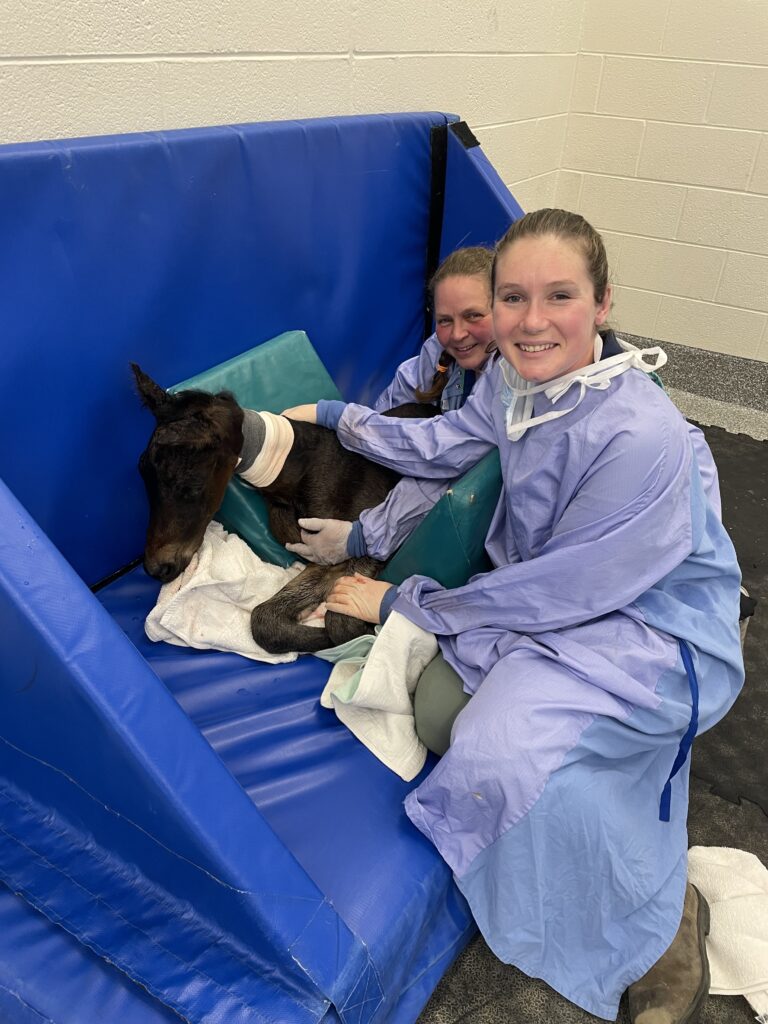
Photo courtesy of Dr. Emilee Lacey
Learn More About Dr. Emilee Lacey, Palm Beach Equine Clinic’s New Internal Medicine Specialist
Dr. Emilee Lacey grew up in California, graduated from the University of Pennsylvania in 2021, and completed an internship at Sports Medicine Associates of Chester County in Cochranville, PA. She has been immersed in the sport horse world her entire life, but her passion for managing fevers, respiratory disorders, and neurologic disease led her away from lameness exams and toward internal medicine. Dr. Lacey completed her large animal internal medicine residency and obtained a Master’s of Science in Biomedical and Veterinary Sciences at Virginia Tech in Blacksburg, VA, this summer. She joined Palm Beach Equine Clinic in August 2025.
What first sparked your love of horses?
My love for horses started at a very young age, but it was really nurtured by my horse-loving grandmother, aunt, and mom. After what felt like years of begging, my mom finally put me in horseback riding lessons when I was in grade school. After about a year of consistent riding, I convinced my mom to let us buy my aunt’s horse, Chili, an off-the-track Thoroughbred (OTTB) that was barely restarted and literally lived across the country in Maryland. She came off the trailer in California like a typical green OTTB: head straight up in the air, nostrils flared, and breathing like a dragon. I was only seven years old at the time, and I thought this was the BEST DAY EVER. My trainer had very different thoughts. This mare not only taught me to ride; she also taught me valuable horsemanship skills I still utilize today. Many other horses have come after Chili, but this mare will always be the spark that truly ignited my love for horses.
What inspired you to become a large animal veterinarian?
I’ve known I wanted to be a veterinarian since I was three years old. I halfheartedly joke that the words “I want to be a vet” were actually my first coherent words. I spent my childhood years obsessed with every TV show or movie that even slightly mentioned veterinary medicine, earned every Girl Scout patch remotely related to veterinary medicine or animals, and volunteered as much time as I could in any clinic or with any equine veterinarian that would take me.
When I finally made it to veterinary school, I was convinced I had to be a small animal veterinarian to have time for my own horses. I was so wrong! During my studies at the University of Pennsylvania, I met many vets who had their own horses and hobbies while maintaining an excellent work-life balance. I also realized that not only was I more interested in large animal medicine, but I was also better at it because I could connect with the owners. I am a horse owner first, and a veterinarian second. I understand how these special animals can become a part of your family.
After veterinary school, I completed an internship with Sports Medicine Associates of Chester County in Pennsylvania. I developed a special interest in managing poor performance that is not related to lameness. Diseases like Equine Asthma, myofibrillar myopathy, gastric ulceration, chronic hepatopathy, and heart murmurs all pulled me away from lameness exams and toward internal medicine. After my internship, I was humbled and honored to complete a large animal internal medicine residency at the Virginia-Maryland College of Veterinary Medicine in Blacksburg, VA. This three-year-long opportunity was a lot of hard work, but I loved every minute. When you love what you do, it doesn’t feel like work. I truly have the best job in the world!
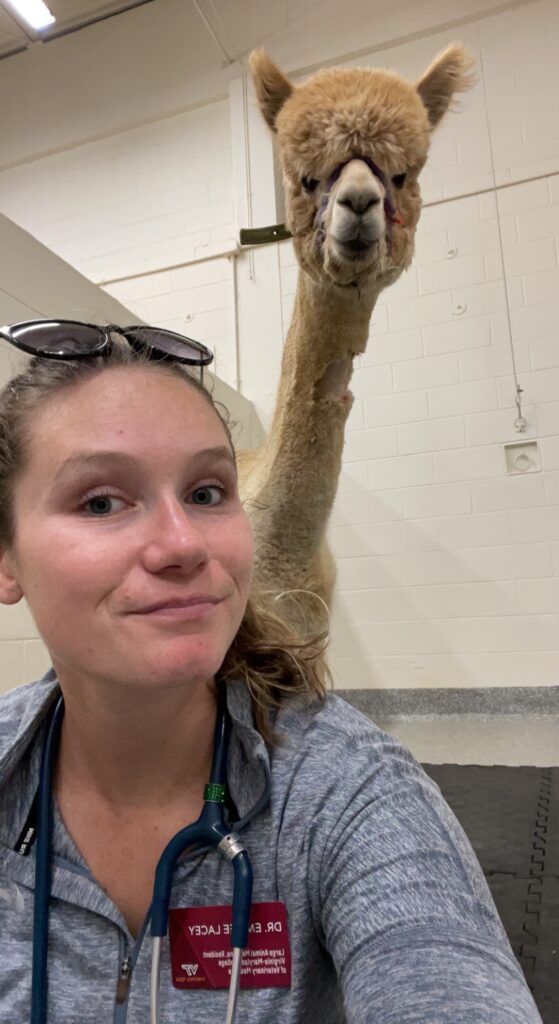
Photo courtesy of Dr. Emilee Lacey.
How did that path lead you to Palm Beach Equine Clinic?
I found my way to Palm Beach Equine Clinic through a few mutual patients while completing my residency in Internal Medicine at Virginia Tech. While caring for these patients in the hospital, I was collaborating with [PBEC Founder] Dr. Paul Wollenman almost daily for a few weeks. During this time, [PBEC President] Dr. Scott Swerdlin reached out to me to gauge my interest in a job opportunity with PBEC. I was so impressed with the communication and collaboration among the veterinarians at this hospital, but what really convinced me was their dedication to excellent patient care. At PBEC, care doesn’t stop when an animal is discharged. The veterinarians here will continue to check in on your horse long after they’ve returned to the barn, and there’s also a team of other veterinarians, technicians, and support staff ready to help you if needed.
What are your current responsibilities or areas of focus at PBEC?
My current area of focus at PBEC is equine internal medicine. This is a specialized branch of veterinary medicine that focuses on the diagnosing and treating diseases affecting internal organ systems, including the heart, lungs, gastrointestinal tract, kidneys, liver, endocrine system, central nervous system, and others. I primarily care for patients in the hospital that require intensive care, but I also dedicate time to recheck examinations and consultations in the field. I tell my friends and family that my job is similar to a human physician working in an intensive care unit in a hospital.
What does a typical day on the job look like for you?
A typical day starts with morning rounds with our associate veterinarians, surgeons, and intern veterinarians to review the status of our current inpatients and update their treatment plans. After rounds, I review any completed daily bloodwork and complete any pending diagnostics, like recheck ultrasound examinations or a gastroscopy, for the current inpatients. I might spend the afternoon at nearby farms completing recheck examinations on previous patients, consulting on new cases from other veterinarians, or conducting an outpatient appointment in the hospital. I am also available for incoming emergency admissions, which can happen quite frequently and without much notice! At the end of every day, I round again with our intern veterinarians, which ensures excellent patient care in a collaborative environment.
What do you enjoy most about being part of the PBEC team?
My favorite part of working at PBEC is the ability to collaborate openly with veterinarians of different specialties and backgrounds. A person simply cannot know everything, and there is always more than one right way to do something. It’s really special to be able to walk down a hallway and talk to three different surgeons about their experiences with a certain diagnosis!
What new technology or recent advancements in veterinary medicine do you find most exciting?
I am most excited about recent advancements in therapeutic options for the management of equine metabolic disease (EMS). EMS is a common endocrine disorder associated with a horse’s inability to regulate their insulin levels – similar to “pre-diabetes” in humans. Horses with EMS are at high risk of developing laminitis, which can be life threatening. Historically, EMS was only managed with dietary changes and the limited efficacy of a short list of medications.
Now with the current use of ertugliflozin, a medication belonging to a class of drugs called sodium-glucose cotransporter 2 (SGLT2) inhibitors, we have another option to reduce a horse’s insulin level in an attempt to prevent laminitis. Further studies are needed regarding long-term use, but we have seen some promising results over the last few years in clinical practice. As a horse owner who lost her heart horse to laminitis, it is really rewarding to help horses who suffer from this condition now.
What’s the most challenging part of being an equine veterinarian, and how do you handle it?
The most challenging part of being an equine veterinarian is convincing young, aspiring veterinarians to join our field! We are facing a national crisis due to the shortage of large animal veterinarians. More newly graduated veterinarians are entering small animal practice, there is an increased rate of early-career equine veterinarians leaving the profession, and a significant number of equine veterinarians are nearing retirement. One of my goals as an equine veterinarian is to show the younger generation that this is the best job in the world. I try to create a welcoming environment for learning by hosting externs and teaching interns every chance I can get. We need more horse vets!
What’s the most rewarding part about serving the equestrian community?
The most rewarding part of serving the equestrian community is having the opportunity to give back to the community that gave me so much growing up. I was so blessed to be surrounded by such thoughtful and caring horse trainers, owners, and veterinarians who cared for me like I was family. I was raised in the horse world, and it’s surreal and humbling to be able to care for these special animals during their most vulnerable times. I hope I never have to meet you and your horse in the hospital during an emergency, but if I do, I understand what it’s like to be the emotional owner! I’m here to care for your horse and support you in whatever decisions we need to make for them.
Is there a particular case or experience you’ve had at PBEC that has been especially meaningful to you?
My first few weeks at PBEC have been filled with some unusual cases, but one pony in particular has gained a special place in my heart. This pony was sick for a few days before being admitted to the hospital. Upon initial examination, I diagnosed an intra-abdominal mass. Through aggressive supportive care as well as anti-inflammatory and antibiotic medicines, this mass has decreased substantially in size, and the pony was able to go home. This pony went from being dull and not eating to being very difficult to catch and developing a voracious appetite. I recently received a video of him playing in a sprinkler at home. Success stories like this remind me of why I chose to pursue this career.
What advice would you share with those who dream of becoming equine veterinarians one day?
To those horse-crazy girls and boys thinking of being an equine veterinarian, don’t give up on your dream! Take every opportunity you can to be around horses, and network with any veterinarian you can. Be brave and introduce yourself – most of us love to chat about this job. If you find yourself in Florida, don’t hesitate to contact PBEC to set up an externship. We need you to join our profession!
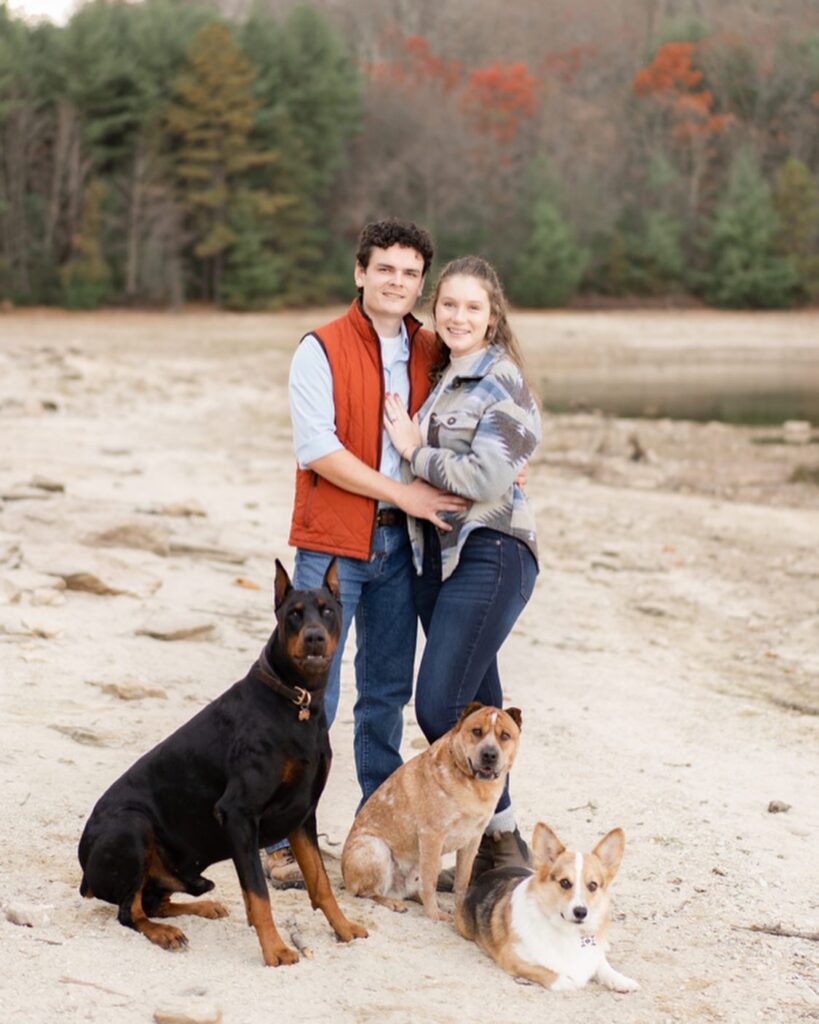
Photo courtesy of Dr. Emilee Lacey.
When you’re not at work, what do you enjoy doing to relax and recharge?
When I’m not at work, you can catch me riding my horse, William, a 16-year-old OTTB gelding who has had me wrapped around his hoof since he was three years old. I have had this horse just a few months longer than I have known my husband, Mike. When I’m not at the barn, Mike and I enjoy walking our dogs on the beach, scuba diving, or simply enjoying a sunny afternoon at the pool with our family. It’s so important to have an identity outside of being a veterinarian, and I aim to be that example!

Where are you from?
I was born and raised in Switzerland, where we speak four national languages —German, French, Italian, and Romansh (an old Swiss tongue that’s still hanging on). I’m from Geneva, which is in the French-speaking part of the country and the best Swiss
city in my humble opinion.
Where did you earn your degree?
In Switzerland, you can only earn a veterinary degree in the German-speaking part. When I was just four years old, I asked my mom if it was possible to have a vocation because I already felt like mine was becoming a veterinarian. Thanks to my parents’
unwavering support, I was able to attend a bilingual school to learn German properly. I eventually studied veterinary medicine at the University of Zurich, which is in the largest city in Switzerland. Back home, veterinary school is structured into a three-year
Bachelor’s program followed by a two-year Master’s. After completing both, we take the federal veterinary licensing exam to become fully qualified.
What is your background with horses?
I started riding when I was three years old and later competed in show jumping for almost 10 years. I had to pause during vet school, but horses have always remained the love of my life. I used to say that my passion wasn’t actually show jumping — it was
taking care of my horses, spending time with them, and getting to know them like my own friends.
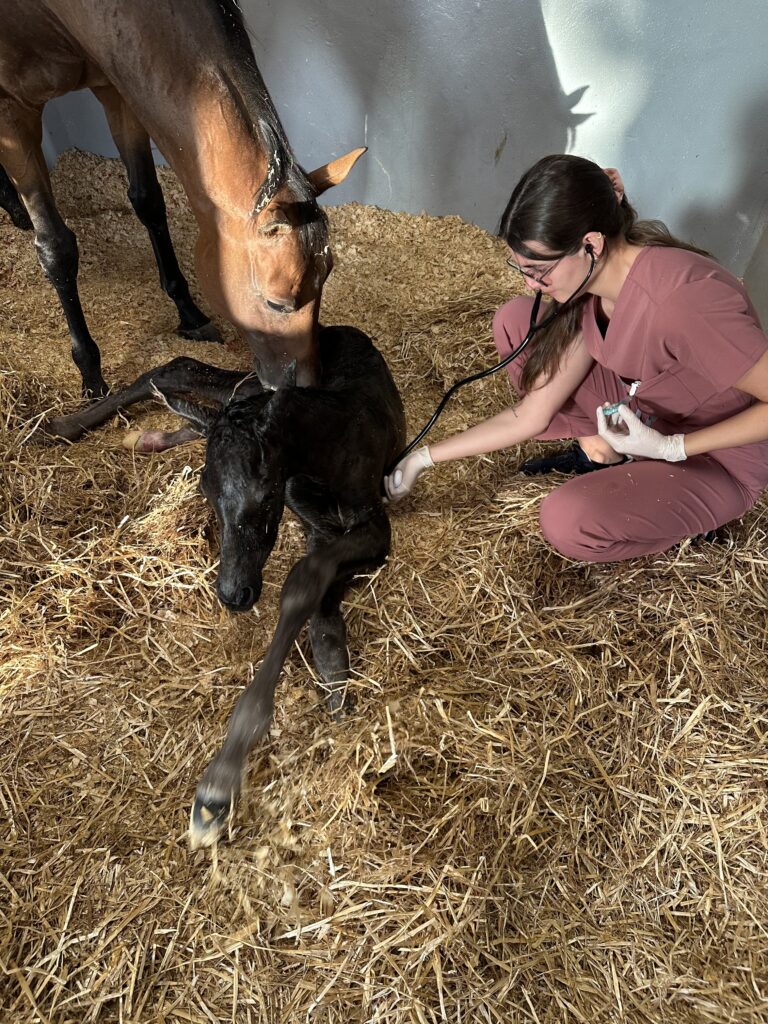
What brought you to PBEC?
I did a four-week externship at PBEC about two and a half years ago and was absolutely starstruck by the level of equine medicine practiced here. The variety of disciplines and cases, combined with the opportunity to learn new ways of practicing,
made me determined to come back.
I love sports medicine, and here you get to see everything — dressage, show jumping, polo, barrel racing, bucking horses, pleasure horses, and even Thoroughbreds. Each discipline brings its own veterinary challenges, and that variety is what makes PBEC so exciting. The clinic’s facilities and the range of specialties, from sports medicine and internal medicine to reproduction and ophthalmology, make it an incredible place to learn. Also, doing an internship in a private clinic rather than a university allows me to practice more hands-on medicine and grow more confident and independent in my clinical decision-making.
What was the process of becoming an intern?
Honestly, it was easier than I expected, thanks to the amazing support from Dr. Swerdlin and his team. I filled out a couple of forms, submitted some documents, made a quick visit to the U.S. Embassy in Switzerland, and I was good to go. They really made the whole process smooth and stress-free. Once I arrived, I had to schedule an appointment to get a Social Security number.
As an international intern, I was a bit worried about housing and transportation, but the clinic has everything well thought out. We’re provided with free housing in a lovely house surrounded by nature, and the company also offers cars for international interns who can’t purchase one at the time of arrival. PBEC really ensures we have great living conditions so that we can fully focus our energy on the internship.
What is the program like so far?
It’s definitely challenging — not just the workload but also being so far from my family and friends for the first time, adjusting to a new environment and the working world, as well as figuring out how to be the kind of veterinarian I want to become. It’s not always easy —internships aren’t for everyone — but I’m adapting.
My colleagues and supervisors have been incredibly supportive, and that makes a huge difference. This program exposes me to every corner of equine medicine, helping me decide what path I want to pursue in my career. And I get to learn from some of the
most experienced and generous equine vets out there.

when choosing an internship at PBEC. Photo courtesy of Sarah Océane Graf
What is a typical day like for you?
I usually get to the clinic around 6 and 7 a.m. to check on my patients and write their SOAPs (notes that stand for Subjective, Objective, Assessment, and Plan). At 8:30 a.m., we have morning rounds with the surgical resident and clinicians where we go
over every patient, update their plans, and ask questions to better understand the cases.
After rounds, depending on my rotation, I might scrub into surgery, run anesthesia, or take in emergency cases. If I have a quieter moment, I’ll research my cases to deepen my understanding or help with outpatient procedures. I also just enjoy spending time
with the patients.
At 5:30 p.m., we do rounds with the overnight intern, who stays at the clinic until midnight (or later, depending on the case load) and is then on call until 8 a.m. One of the day interns is also on call for anesthesia each day.
What is something new that you’ve learned?
So much, and it’s only been a month. I can now confidently run general anesthesia, place arterial and venous catheters, perform abdominocentesis, and do a flash ultrasound. I even got to inject a coffin joint! I’ve also spent time in the reproduction
department and can now perform transrectal ultrasounds of the mare’s reproductive tract, do uterine flushes and infusions, and place urinary catheters. The list keeps growing, and I’m so grateful for the learning opportunities.
What do you do in your free time?
I brought my dog, Pepper, with me, so we spend time at the beach in Palm Beach or Jupiter, run around the neighborhood, or go to the dog park. In the evenings or on weekends, I read and re-read Harry Potter.
I’ve also discovered the wonders of Target, Whole Foods, and the mall… I may or may not have spent at least 24 hours there already.
And of course, I call my boyfriend… who patiently listens to me talk about transrectal ultrasounds while wondering where his life took a very specific turn.
Originally from northern California, Dr. Janet Greenfield Davis grew up competing on the hunter circuit which sparked her interest in equine veterinary medicine. She completed her undergraduate degree at California Polytechnic State University, and went on to complete veterinary school at the University of Glasgow. While in the UK, she became a member of the Royal College of Veterinary Surgeons.
After completing an internship at Palm Beach Equine Clinic in 2010, Dr. Greenfield Davis studied traditional Chinese veterinary medicine at the Chi Institute. In addition to providing western medicine, Dr. Greenfield Davis employs eastern medicine as a certified veterinary acupuncturist and Chinese herbal medicine expert.
When not seeing patients, Dr. Greenfield Davis enjoys cheering on her clients at competitions, swing dancing, and spending time with her husband, fellow Palm Beach Equine Clinic veterinarian Dr. Tyler Davis, and their two daughters. We featured Dr. Greenfield Davis nearly 10 years ago and have caught up with her to see how things have changed in a decade.
1. Our last Q&A with you was in 2015 when your girls were just babies – what’s it like now balancing your veterinary career with older kids that have interests of their own? Are horses part of their lives?
It is certainly different having older children and practicing veterinary medicine. Maisie is now 9 and Zella is 11. They do have interests of their own. Gone are the days of loading everyone in the truck and working through naptime. Now I adjust my workday to accommodate after-school sports and homework. While they sometimes enjoy riding around with me on calls they would prefer to do something else. I try much harder to take my weekends off to spend time with them. I feel like these are the years they will remember the most, and I don’t want those memories to be of their iPads. Instead, it can be of their parents prying their iPads from their little fingers to go clean the turtle tank on a bright Saturday afternoon.
The girls did attempt riding for a while, but it didn’t stick. Their horse time is preferably spent at the clinic where they can watch all their favorite vets perform procedures and then have Dr. Swerdlin make them hot cocoa. There is a secret ingredient but it is not mine to divulge.

2. Is acupuncture still a big part of your practice? How do you see it help horses in day-to-day management?
It is! My acupuncture practice encompasses about 80% of what I do. We use acupuncture for pain relief and management, post-surgical rehabilitation, vices, nervous horses, lameness, and so much more. I also work in Equine Rehabilitation to help strengthen training practices and improve agility.
3. How does working with Vinceremos Therapeutic Riding Center still hold meaning for you? What are your usual duties there?
I have been the primary veterinarian at Vinceremos for 14 years with aid from my colleagues. It is beneficial work and of course it holds meaning for me. I know many of the clients and after so many years, the Vinceremos horses feel like my own.
4. Are there still other programs outside of PBEC that you work with in the community?
I mainly volunteer at my kids’ school when I can. I have a career day coming up. I eagerly anticipate the questions asked by kindergarten to fifth grade students. They always surprise me, and we usually have a good laugh.
5. Do you work with the internship program at PBEC? What are the benefits of that program for the clinic and for you as a vet?
I do work with the internship program at PBEC, and actually, all our vets do. Our clinic trains new graduates into confident, seasoned veterinarians.

6. Have you had any additional continuing education or certifications since you became a certified equine rehabilitation practitioner?
Nothing new yet. I am currently working to further myself as an FEI delegate.
7. What do you find is most fulfilling still in your career?
The most fulfilling part of veterinary medicine is having a happy client and a happy horse. It doesn’t matter if it is a colic or helping to achieve their competitive goals. The satisfaction is knowing that everyone is healthy and happy.
8. What is something you have seen or heard about that is developing in the veterinary industry that you are excited about?
The veterinary field is constantly changing. New research is done every day. I am excited about it all!
Meet PBEC Intern Valentine Prié DVM
Valentine Prié DVM earned her veterinary degree in Croatia and spent time in several equine clinics in Europe before heading to the United States in 2024 to broaden her knowledge. She’s part of the class of 2024/2025 interns at the Palm Beach Equine Clinic (PBEC) in Wellington, FL.

Where are you from?
I’m from Normandy in the northwest part of France. For the last six years, I have mostly lived in Croatia, where I did both my undergraduate and vet school work. In 2024, I moved to the U.S. and have been an intern at PBEC since July.
What is your background with horses?
I started riding when I was 5 years old. My family were ranchers, and we had a cattle and horse farm, so I was always around horses. I did mostly show jumping.
What brought you to PBEC?
I always wanted to be a vet — it was not even a question. My great-grandfather founded a vet school in France, and my brother is also going to graduate as an equine vet. It’s in the family!
I moved to Croatia shortly after turning 18 and graduated from the University of Zagreb’s vet school. During my fifth year, I spent some time in Austria at the University of Vienna. This year, I completed part of my final rotation at UC Davis in California.
I wanted to explore as many different approaches to equine medicine as possible. Things here in the U.S. are done differently, not just technique, but the approach to patient care and communication and the use of medications. My goal is to have, as much as possible, an open mind to veterinary practice.
When I complete the program at PBEC, I will head to going to Hagyard in Kentucky for a specialized internship.

What is the process of becoming an intern at PBEC?
I came to PBEC two years ago for a summer externship. After staying in touch with some previous interns and employees at the clinic, I applied last winter, had my interview in February, and in March, Dr. Swerdlin started helping me with the visa process. I began the internship in July.
What is the program like?
It’s been busy! I want to see as much as possible and experience all the areas of equine medicine — surgery, internal medicine, and ambulatory as well. It’s a really busy clinic with a high caseload and many veterinarians from various parts of the world, each withdifferent approaches to medicine and slightly different practices. That’s really beneficial for me to compare what can be done. It’s been a great learning experience. I see a lot and try to listen and remember!
What’s a typical day like for you?
Our schedule is organized on rotation, so we do two weeks of anesthesia, two weeks of surgery, two weeks of hospitalization/internal medicine, two weeks of ambulatory, and two weeks of overnight. Depending on which rotation I am on, the day is different.
Usually, you check the patients assigned to you for your rotation — I will do a full physical examination and write notes for every patient. After rounds, we get everything ready; for instance, with surgery, we bring the horse and assist with the surgery and the recovery of our patient. Then we take care of their treatment plan.

What do you do in your free time?
I’m a runner. I’m preparing for the Miami Marathon in February. I did the Toronto Marathon in 2024. And I read! I love all the French classical novels and poetry. I read a lot of equine medicine articles and books, too.
By Lindsay Berreth/Jump Media
Meghan Duncan of Ocala, FL, has worked at the Palm Beach Equine Clinic (PBEC) in Wellington, FL, since 2021. Since 2022, she’s been Dr. Paul Wollenman’s technician, traveling to Wyoming in the summer and based at PBEC in the winter, where she assists clients with polo ponies.

What is your background with horses?
I rode and showed Western pleasure as a kid. As I grew older, I got out of horses and became more involved with school and sports, so horses kind of took a back seat. I always had a love and interest for it, but I just didn’t have the resources and the time to make it happen.
I moved to South Florida in 2008 for college, and around 2020, with COVID going on and big changes happening for a lot of people, I found myself in a position where I was no longer able to work my job in hospitality, which I had been doing since I was 15.
After some personal life events had happened, I needed something to get me out of the house. My mom mentioned an animal rescue that always needed volunteers. The couple who ran the rescue were elderly, so it was difficult for them to take care of the horses. I fell in love with being around the horses again.

What brought you to PBEC?
When I was a kid, I always wanted to be an equine vet. That was my dream. It just never happened, but one night, while I was volunteering at the rescue, one of the horses was colicking. They called me to see if I could help the vet, who was coming without a technician. I got to meet the emergency vet and see how that whole process worked for the first time. I was really intrigued.
The vet came out again the next day to recheck the horse and asked me if I wanted a job. I told him, yeah, that’d be great! He needed help on the weekends. He was a large animal vet, so he did horses, cows, goats, and sheep.
I wanted to work with horses specifically, and PBEC had a job post for a hospital technician, and the rest is history. I was hired in March 2021 by Dr. Kathleen Timmins and Holly Hall.

What does your job involve?
In 2022, I had the opportunity to work with Dr. Paul Wollenman, who founded the clinic in 1981. He worked in Florida in the winter and traveled to Wyoming in the summer to continue practicing. It sounded like a dream. I really wanted to take the opportunity to start traveling again.
We go to Big Horn, WY, in the summer and come back to Florida for the winter and spring. We work on polo ponies 99% of the time. There are some clients in Wyoming who have rodeo or ranch horses we work on.
Day to day, we see a lot of lamenesses and small wounds on the polo ponies — we do a lot of ultrasounding and regenerative therapy like PRP or stem cell injections. My job is to jog the horse, to keep the horse as still and quiet as possible while being treated, and I’ll help with scrubbing joints for joint injections, bandaging, keeping the inventory up to date, keeping the truck clean and stocked, uploading information to patient files, and handling some client communications.
What’s the most interesting thing about your job?
I like any kind of emergency care just because it’s something different. You don’t know what you’re going to walk into. It’s unpredictable, and you have to think on your feet.

What do you do in your free time?
When I’m in Wyoming, I love to go trail riding with a couple of friends or hiking with my dog. Our schedule is kind of crazy in Florida, but I like to spend time with my dog, go on long adventure walks, and find somewhere to hike or trail. I also like to go to the gym, work out, and do Crossfit.